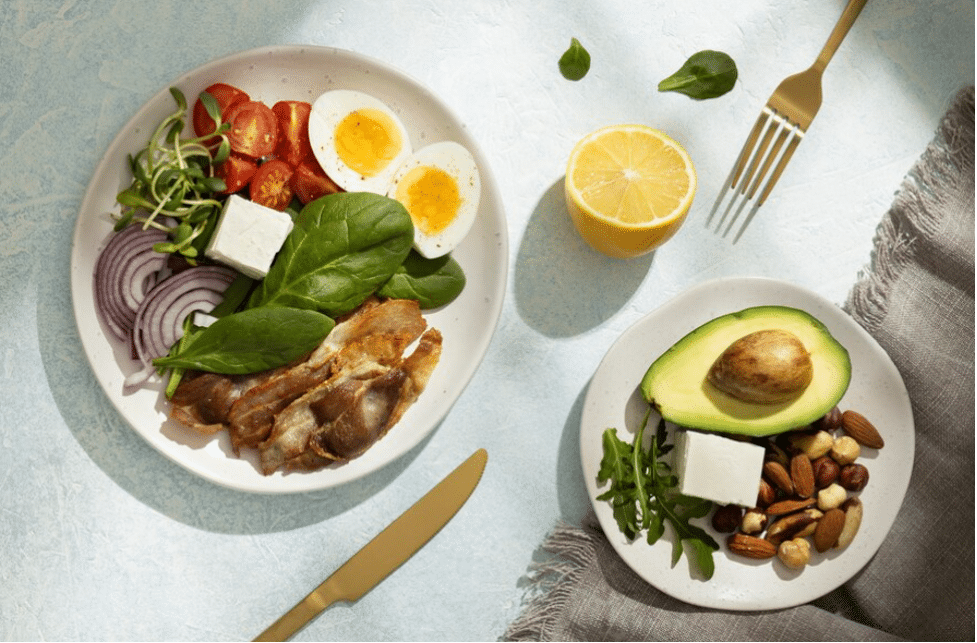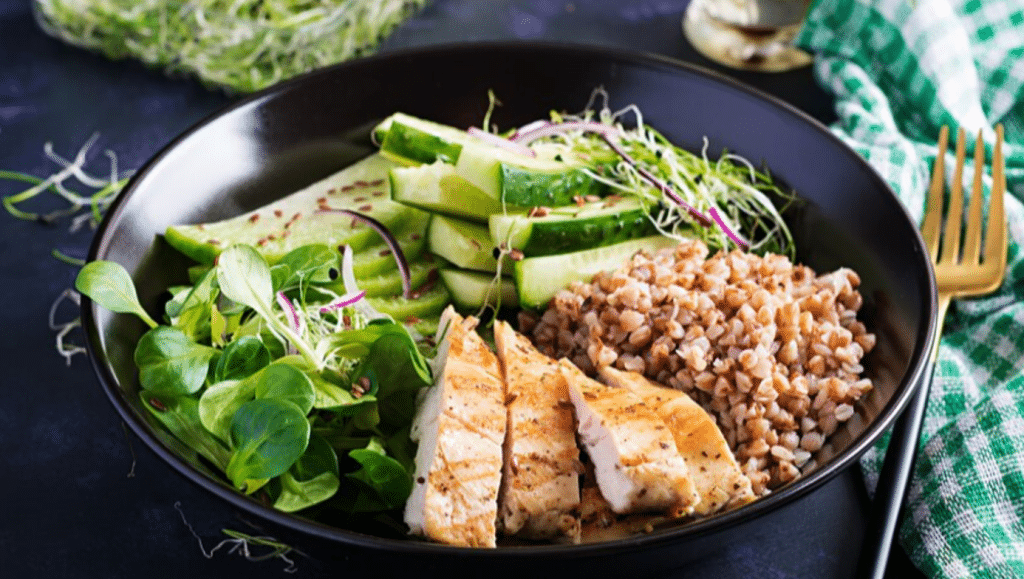In the quest for a healthier lifestyle, the zero-carb diet has gained attention for its extreme approach. This article explores the health implications of a zero-carb diet, helping you understand if it’s a safe and wise choice for your well-being.
What is a Zero-carb diet?
A zero-carb diet essentially involves minimizing carbohydrate intake as much as possible. While it might appear similar to other low-carb diets such as Atkins or Keto, it has its own unique characteristics.
In the Atkins diet, for example, individuals are encouraged to consume between 20 and 100 grams of net carbs per day, depending on their specific plan. The term “net carbs” refers to the total carbohydrates minus the fiber in a given meal.
By considering net carbs, Atkins allows some room for certain carbohydrate foods, particularly those that are also significant sources of fiber.
The Keto diet, another well-known plan, also restricts carbohydrate intake. Keto practitioners typically aim for 50 grams or fewer of carbohydrates per day. Additionally, the Keto diet emphasizes high fat intake and moderate protein consumption.
In contrast, a zero-carb diet advocates for the lowest possible carbohydrate intake, without providing specific directives on how to divide protein and fat intake.

Foods to eat on a Zero carb diet
On a zero-carb diet, the primary focus of recipes is to eliminate or drastically minimize carbohydrate intake. While the options for food are limited, here are some foods you can consider:
Animal Products
• Meat: Beef, pork, lamb, poultry (chicken, turkey), and game meats are typically zero-carb.
• Fish: Most fish, such as salmon, trout, and sardines, contain minimal carbs.
• Seafood: Shrimp, crab, lobster, and other shellfish are low in carbs.
• Eggs: Eggs are very low in carbohydrates and provide essential nutrients.
Dairy
• Cheese: Hard cheeses like cheddar, mozzarella, and parmesan have minimal carbs.
• Heavy Cream: Heavy cream is low in carbs and can be used in small amounts for cooking or coffee.
Fats and Oils
• Butter: Butter contains virtually no carbs and is commonly used in low-carb diets.
• Olive Oil: Olive oil is a healthy source of fat with no carbohydrates.
• Coconut Oil: Coconut oil is another zero-carb option and can be used in cooking and baking.
Condiments and Seasonings
• Salt and Pepper: These seasonings are carb-free and can enhance the flavor of your
• Vinegar: Most types of vinegar are carb-free and can be used for salad dressings.
Some Vegetables (in very limited quantities):
• Lettuce: Iceberg and Romaine lettuce have very few carbs.
• Spinach: Spinach is low in carbs and rich in nutrients.
• Arugula: Arugula is a low-carb leafy green.
Foods to avoid on Zero carb diet
On a zero-carb diet, the primary goal is to eliminate or minimize carbohydrate intake as much as possible. Therefore, you should avoid foods that are high in carbohydrates. Here are some foods to avoid on a zero-carb diet:
Grains and Cereals
• Bread
• Rice
• Pasta
• Cereals
• Oats
Starchy Vegetables
• Potatoes
• Sweet potatoes
• Corn
• Peas
Legumes
Sugary Foods
Fruits
• Most fruits are high in carbohydrates, so they are generally not consumed on a zero-carb diet. Berries like strawberries and blackberries have fewer carbs than other fruits but are still relatively high in carbs compared to other zero-carb options.
Processed and High-Carb Foods
Beverages
• Sugary drinks like soda and fruit juices should be avoided.
Alcohol
Benefits of a No-Carb Diet
Some of the bennifits of zero carb diet include:
• Weight Loss: Like other low-carb diets such as keto, no-carb diets often lead to initial weight loss, primarily through the shedding of water weight.
• Improved Insulin Sensitivity and Blood Sugar: Some proponents of no-carb diets suggest potential benefits related to enhanced insulin sensitivity and blood sugar management. However, the efficacy of these claims is a subject of debate.
• Heart Health Improvement: Reducing carbohydrate intake, especially refined carbs and sugar, may have positive effects on heart health.
• Lower Triglyceride Levels: Very low-carb diets have been linked to reduced blood triglyceride levels, which can lower the risk of heart disease. One study on overweight men showed a 39% decrease in triglyceride levels after reducing carb intake to 10% of daily calories.
• Lower Blood Pressure: Some research suggests that reducing carbohydrate intake may help lower blood pressure.
• Reduction of Belly Fat: Limited studies indicate that very low-carb diets may be more effective than low-fat diets in reducing belly fat, which is associated with inflammation and certain diseases.

Risks of the Zero-Carb Diet
Some of the potential risks of the no carb diet include:
• Nutrient Deficiencies: A zero-carb diet poses a significant risk of nutrient deficiencies. By eliminating or severely restricting foods such as beans and legumes, whole grains, fruits, and starchy vegetables, you may miss out on essential vitamins, minerals, antioxidants, phytochemicals, dietary fiber, probiotics, and prebiotics.
• Poor Gut Health: This diet may negatively impact your gut health by eliminating major sources of probiotics, prebiotics, and dietary fiber. Fiber is crucial for maintaining a healthy gut, promoting regular digestion, and ensuring proper bowel movements. Probiotics and prebiotics support gut health and have potential benefits for the immune system, weight management, and mental health.
• Adverse Effects on Heart Health: The zero-carb diet primarily emphasizes animal-based proteins and products while imposing no limits on saturated fat consumption. Replacing whole grains, fruits, and vegetables with high-saturated fat foods can lead to elevated lipid levels, which is detrimental to heart health, as cautioned by the American Heart Association. Decades of research have demonstrated the adverse effects of excessive saturated fat in the diet.
• Risk of Developing an Eating Disorder: Engaging in extreme dieting and disordered eating behaviors increases the risk of developing an eating disorder, as acknowledged by both the Academy of Nutrition and Dietetics and the National Eating Disorders Collaboration.
Is Zero carb diet healthy?
Whether or not a zero-carb diet is healthy is a matter of debate. Some people believe that zero-carb diets can be very healthy, while others believe that they are too restrictive and can lead to nutrient deficiencies and other health problems.
Leading health organizations recommend that carbohydrates should account for 45 to 65 percent of your total daily calorie intake, as advised by the Mayo Clinic. For example, if you consume 2,000 calories per day, your carbohydrate intake should ideally fall within the range of 225 to 325 grams.
Furthermore, the Zero-Carb Diet involves the elimination or severe restriction of foods such as whole grains, vegetables, fruits, and legumes. These food groups are significant sources of dietary fiber, and the well-established health benefits of fiber range from reducing the risk of cardiovascular disease to supporting optimal gut health, as demonstrated in a review paper published in the journal “Nutrients” in April 2013. Additionally, these foods provide phytochemicals, antioxidants, vitamins, and minerals that are not typically found in animal-based products like meat, butter, or eggs.
Finally, the Zero-Carb Diet places a heavy emphasis on animal proteins and products without considering factors like fat content, saturated fat, sodium, or protein quality. Many highly processed meats and cheeses are high in sodium, and aside from poultry and seafood, most contain significant amounts of saturated fat.
National guidelines recommend limiting saturated fat intake to 10 percent of your total daily calorie intake, with 7 percent being the ideal target to further reduce the risk of heart disease, according to the U.S. National Library of Medicine. Using a 2,000-calorie diet as an example, this would translate to a daily saturated fat intake of no more than 16 to 22 grams.
What is the difference between the lion diet and Zero-carb diet?
The Lion Diet (a strict type of carnivore diet meal plan) and the Zero Carb Diet are both low-carb dietary approaches, but they have distinct differences.
The Lion Diet is a highly animal-based diet that emphasizes raw and unprocessed animal foods, excluding plant-based options entirely. It has a particular focus on consuming organ meats.
In contrast, the Zero Carb Diet primarily eliminates carbohydrates while allowing a variety of cooked animal-based foods, including meats, eggs, and dairy, with a less strict stance on raw consumption.
The Zero Carb Diet also has a larger and more established community of followers who share experiences and support for those interested in this dietary approach.
It’s important to note that both diets are highly restrictive and may not provide a balanced intake of essential nutrients, so consulting a healthcare professional or dietitian is advised before considering either of these regimens.
Conclusion
The zero-carb diet is extreme, eliminating all carbohydrates. Whether it’s a wise choice for your health is a subject of debate. While some see potential benefits, concerns about its strict limitations and potential nutrient deficiencies are raised.
Leading health organizations recommend a balanced diet with a significant carbohydrate intake, including foods like whole grains, vegetables, fruits, and legumes, which provide dietary fiber and essential nutrients not found in animal-based products.
The potential risks, from nutrient deficiencies to gut health issues and the negative impact of excessive saturated fat, are significant.
While some may find success with the zero-carb diet, it’s a polarizing choice with both benefits and potential downsides.
